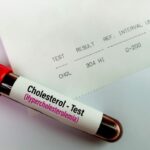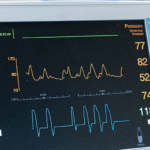Atrial fibrillation (AFib) is a common heart rhythm disorder where the upper chambers of the heart (atria) beat irregularly and rapidly. This chaotic rhythm can lead to blood clots, stroke, and other serious complications. Older adults are at a higher risk, as are individuals with pre-existing heart conditions, high blood pressure, or a family history of AFib. Early diagnosis and treatment are essential to prevent these potential health issues.
Causes & Risk Factors
AFib can be caused by various factors, including damage to the heart’s electrical system due to coronary artery disease, high blood pressure, heart valve disease, or congenital heart defects.6 Lifestyle factors, such as excessive alcohol consumption, smoking, and obesity, also contribute. Medical conditions like sleep apnoea, thyroid problems, and lung disease can trigger AFib.8 Genetic predisposition can also play a role.
Symptoms
Symptoms of AFib can vary. Some people experience no symptoms at all, while others may feel palpitations (a fluttering or racing heart), fatigue, shortness of breath, dizziness, or chest pain.9 Mild AFib might occur intermittently, while severe AFib can be persistent. If you experience sudden palpitations, chest pain, or fainting, seek immediate medical attention.
Diagnosis
Diagnosing AFib involves a combination of medical history, physical examination, and diagnostic tests. An electrocardiogram (ECG) is the primary test to detect AFib. Holter monitors or event recorders can be used to monitor heart rhythm over longer periods. Blood tests can check for thyroid problems or electrolyte imbalances. An echocardiogram can assess the structure and function of the heart. Early detection is crucial for effective management and to prevent complications.
Treatment Options
Treatment for AFib aims to control heart rate, restore normal rhythm, and prevent blood clots.6 Lifestyle changes are often recommended, including a heart-healthy diet, regular exercise, and smoking cessation. Medications like beta-blockers or calcium channel blockers can control heart rate.8 Anticoagulants are prescribed to reduce the risk of stroke.9 In some cases, cardioversion (electrical shock or medication to restore normal rhythm), catheter ablation (destroying abnormal tissue causing AFib), or left atrial appendage closure (to prevent blood clots) may be necessary.
Complications & Risks
Untreated AFib can lead to serious complications, including stroke, heart failure, and blood clots. AFib significantly increases the risk of stroke due to the formation of blood clots in the atria. Chronic AFib can impact quality of life, causing fatigue, shortness of breath, and anxiety. It’s vital to manage AFib effectively to minimise these risks.
Prevention & Management
Preventing AFib involves adopting a heart-healthy lifestyle. This includes maintaining a healthy weight, eating a balanced diet, exercising regularly, and avoiding smoking and excessive alcohol consumption. Regular check-ups with your doctor are crucial for monitoring heart health and detecting any changes. Managing underlying conditions like high blood pressure or diabetes is also essential.
If you’re experiencing heart palpitations or any other symptoms of AFib, it’s important to seek medical advice. Our experienced cardiologists can provide comprehensive evaluations, accurate diagnoses, and personalised treatment plans to help you manage your AFib and reduce your risk of complications. Don’t let an irregular heartbeat disrupt your life. Schedule a consultation today and take control of your heart health.










